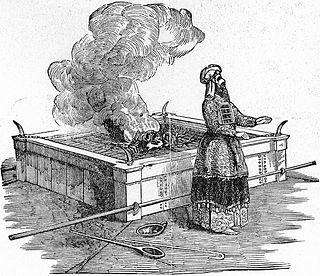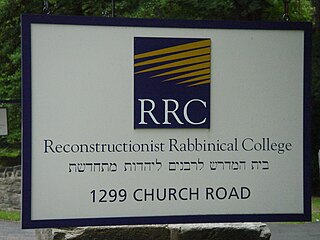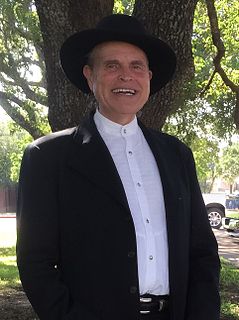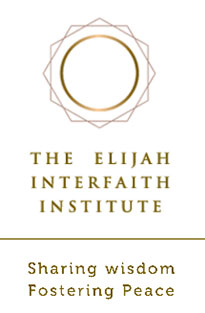The role of women in Judaism is determined by the Hebrew Bible, the Oral Law, by custom, and by cultural factors. Although the Hebrew Bible and rabbinic literature mention various female role models, religious law treats women differently in various circumstances.

Clergy are formal leaders within established religions. Their roles and functions vary in different religious traditions, but usually involve presiding over specific rituals and teaching their religion's doctrines and practices. Some of the terms used for individual clergy are clergyman, clergywoman, and churchman. Less common terms are churchwoman and clergyperson, while cleric and clerk in holy orders both have a long history but are rarely used.
In Judaism, a rabbi is a teacher of Torah. The basic form of the rabbi developed in the Pharisaic and Talmudic era, when learned teachers assembled to codify Judaism's written and oral laws. The first sage for whom the Mishnah uses the title of rabbi was Yohanan ben Zakkai, active in the early-to-mid first century CE. In more recent centuries, the duties of a rabbi became increasingly influenced by the duties of the Protestant Christian minister, hence the title "pulpit rabbis", and in 19th-century Germany and the United States rabbinic activities including sermons, pastoral counseling, and representing the community to the outside, all increased in importance.

Meshullam Zalman Schachter-Shalomi, commonly called "Reb Zalman", was one of the founders of the Jewish Renewal movement and an innovator in ecumenical dialogue.

Jewish Renewal is a recent movement in Judaism which endeavors to reinvigorate modern Judaism with Kabbalistic, Hasidic, and musical practices. Specifically, it seeks to reintroduce the "ancient Judaic traditions of mysticism and meditation, gender equality and ecstatic prayer" to synagogue services. It is distinct from the baal teshuva movement of return to Orthodox Judaism.
Neo-Hasidism is a name given to contemporary Jewish trends of a significant fusing or revival of interest in the teachings of Kabbalah and Hasidism by members of other existing Jewish movements. Among non-Orthodox Jews, this trend stems from the writings of non-Orthodox teachers of Hasidic Judaism like Martin Buber, Abraham Joshua Heschel, Lawrence Kushner, Zalman Schachter-Shalomi and Arthur Green. This is usually associated with the members of the Jewish Renewal movement. A second form of this trend is found within the Modern Orthodox Jewish community, and is referred to as Neo-Chassidus, involving those who are Modern Orthodox but have taken interest in the works of Hasidic masters.
The term Elder, or its equivalent in another language, is used in several countries and organizations to indicate a position of authority. This usage is usually derived from the notion that the oldest members of any given group are the wisest, and are thus the most qualified to rule, provide counsel or serve the said group in some other capacity.

Arthur Ocean Waskow is an American author, political activist, and rabbi associated with the Jewish Renewal movement.
Jewish views on evolution includes a continuum of views about the theory of evolution, experimental evolution, the origin of life, age of the universe, evolutionary creationism, and theistic evolution. Today, many Jews accept the theory of evolution and do not see it as incompatible with traditional Judaism, reflecting the emphasis of prominent rabbis such as the Vilna Gaon and Maimonides on the ethical rather than factual significance of scripture.

The Reconstructionist Rabbinical College (RRC) is a Jewish seminary in Wyncote, Pennsylvania. It is the only seminary affiliated with Reconstructionist Judaism. It is accredited by the Commission on Higher Education of the Middle States Association of Colleges and Schools. RRC has an enrollment of approximately 80 students in rabbinic and other graduate programs.

Paul Wolff is a screenwriter, actor, producer and popular screenwriting Professor at the University of Southern California School of Cinematic Arts. He retired in 2016 after teaching at the university for over twenty years. Before he made the move to teaching and acting, Wolff had a prolific career in television which spanned nearly three decades.

In Judaism, God has been conceived in a variety of ways. Traditionally, Judaism holds that YHWH, the God of Abraham, Isaac, and Jacob and the national god of the Israelites, delivered the Israelites from slavery in Egypt, and gave them the Law of Moses at biblical Mount Sinai as described in the Torah. According to the rationalist stream of Judaism articulated by Maimonides, which later came to dominate much of official traditional Jewish thought, God is understood as the absolute one, indivisible, and incomparable being who is the ultimate cause of all existence. Traditional interpretations of Judaism generally emphasize that God is personal yet also transcendent, while some modern interpretations of Judaism emphasize that God is a force or ideal.
Elise M. Boulding was a Norwegian-born American Quaker sociologist, and author credited as a major contributor to creating the academic discipline of Peace and Conflict Studies. Her holistic, multidimensional approach to peace research sets her apart as an important scholar and activist in multiple fields. Her written works span several decades and range from discussion of family as a foundation for peace, to Quaker spirituality to reinventing the international "global culture." Particularly of note is her emphasis on women and family in the peace process.
Arthur Kurzweil is an American author, educator, editor, writer, publisher, and illusionist.
The Zen Peacemakers is a diverse network of socially engaged Buddhists, currently including the formal structures of the Zen Peacemakers International, the Zen Peacemaker Order and the Zen Peacemaker Circles, many affiliated individuals and groups, and communities formed by Dharma Successors of Roshi Bernie Glassman. It was founded by Bernie Glassman and his wife Sandra Jishu Holmes in 1996, as a means of continuing the work begun with the Greyston Foundation in 1980 of expanding Zen practice into larger spheres of influence such as social services, business and ecology but with a greater emphasis on peace work. Zen Peacemakers has developed from the White Plum Asanga lineage of Taizan Maezumi.

Elijah Interfaith Institute is a nonprofit, international, UNESCO-sponsored interfaith organization which was founded by Rabbi Alon Goshen-Gottstein in 1997.
The Garrison Institute is a non-profit, non-sectarian organization located in Garrison, New York, that is committed to harnessing the power of contemplative wisdom and practice—from many traditions, and in many different contexts—to build a more compassionate and resilient future for all. Working collaboratively with practitioners in diverse fields, the Institute develops and hosts retreats and symposia, produces research and publications, and provides a hub for ongoing learning networks.

The Open Siddur Project is an open-source, web-to-print publishing and digital humanities project intent on sharing the semantic data of Jewish liturgy and liturgy-related work with free-culture compatible copyright licenses and Public Domain dedications. The project collaborates with other efforts in open-source Judaism in sharing content and code, advocates among related user-generated content projects to adopt Open Content licensing, and solicits copyright owners of related liturgical materials to share their work under free-culture compatible terms.
Rami M. Shapiro, commonly called "Rabbi Rami", is an author, teacher, and speaker on the subjects of liberal Judaism and contemporary spirituality. He served for ten years as Adjunct Professor of Religion at Middle Tennessee State University.
Naftali Rothenberg is an Israeli scholar, rabbi and author. He is known for his studies on the wisdom of love in Jewish Canonical literature and his inclusive leadership in the Israeli rabbinate.












